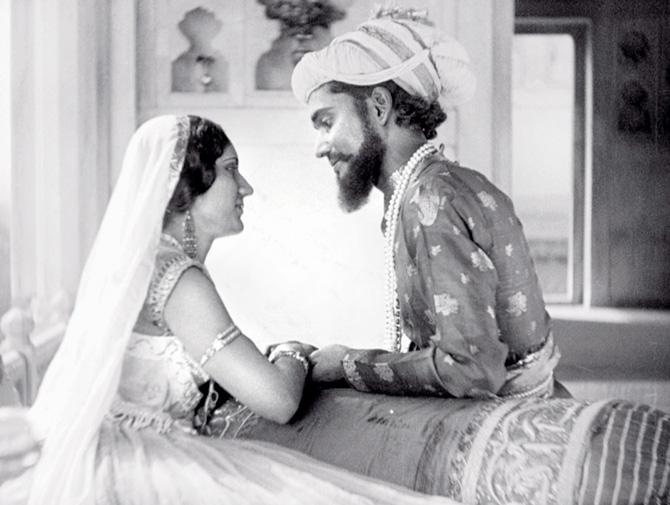It was a telling 'Bombay moment'. We had been watching the 1928 silent film Shiraz: A Romance of India, with live musical accompaniment composed and played by Anoushka Shankar, with an ensemble of seven musicians, at Shanmukhananda Hall last Sunday


Selima (Enakshi Rama Rao) and Shah Jahan (Charu Roy), in Shiraz. Pic/BFI
 It was a telling 'Bombay moment'. We had been watching the 1928 silent film Shiraz: A Romance of India, with live musical accompaniment composed and played by Anoushka Shankar, with an ensemble of seven musicians, at Shanmukhananda Hall last Sunday. The story is of the orphaned Persian princess, Selima, adopted by a potter and raised with his son Shiraz. Later Shiraz (Himansu Rai) falls in love with Selima (Enakshi Rama Rau), but she is kidnapped and sold to Prince Khurram (Charu Roy) who also falls in love with her. Shiraz desperately traces Selima to the palace, and when caught talking to her, Khurram asks Selima if she loves Shiraz. “No, I have always thought of him as my brother,” she replies, and the entire Mumbai audience collectively groaned. Briony Hanson, British Council Director of Film, told me that they had played the film and music in London and four Indian cities, but Bombay groaned the loudest. Selima friend-zones poor Shiraz (Rai is lead actor and the film's producer), and worse, bro-zones him.
It was a telling 'Bombay moment'. We had been watching the 1928 silent film Shiraz: A Romance of India, with live musical accompaniment composed and played by Anoushka Shankar, with an ensemble of seven musicians, at Shanmukhananda Hall last Sunday. The story is of the orphaned Persian princess, Selima, adopted by a potter and raised with his son Shiraz. Later Shiraz (Himansu Rai) falls in love with Selima (Enakshi Rama Rau), but she is kidnapped and sold to Prince Khurram (Charu Roy) who also falls in love with her. Shiraz desperately traces Selima to the palace, and when caught talking to her, Khurram asks Selima if she loves Shiraz. “No, I have always thought of him as my brother,” she replies, and the entire Mumbai audience collectively groaned. Briony Hanson, British Council Director of Film, told me that they had played the film and music in London and four Indian cities, but Bombay groaned the loudest. Selima friend-zones poor Shiraz (Rai is lead actor and the film's producer), and worse, bro-zones him.
ADVERTISEMENT
Subsequently, when Selima (later Queen Mumtaz Mahal) dies, Prince Khurram (later Emperor Shah Jehan), commissions the now-blind Shiraz to design a monument in her memory. It is a fiction, of course, and here the Taj Mahal becomes a symbol of borrowed love memories: Shah Jehan outsourced his memories of love and grief to Shiraz, his rival in love, in the manner of a modern lover getting a buddy to write his love letters. Oh Karan! Thou shouldst be here at this hour! The film got standing ovations in Mumbai, Hyderabad, New Delhi and Kolkata, in this tour organised by the British Council, in partnership with the British Film Institute (BFI).
The film, restored by the BFI, was lustrous and showed off the magnificent black and white cinematography by Emil Schunemann and Henry Harris. Watching this glorious restoration was like travelling first class: it is a gorgeous experience, then you are condemned to a life of watching unrestored or poor, machine-restored archival film prints, and it's like travelling cattle class again. The film, for which the BFI commissioned Anoushka Shankar to compose and play live music, is the high point of the BFI's India on Film programme, headed by Robin Baker, BFI Head Curator, for which I am Guest Curator, curating South Asian films that are screening at the BFI Southbank in London all year from March-December 2017.
I have shown a number of good archival prints from the National Film Archive of India (NFAI) for film packages I have curated over the years, including Indian Expressionism for the TIFF Bell Light Box, Toronto, and a V Shantaram retrospective at the Busan Film Festival. Yet, it is still challenging to find high quality 35mm prints that are both well restored and have good English sub-titles, so I've sadly had to drop a whole season of Indian archival films planned to be screened overseas this year.
Shiraz is an excellent example of an early Indo-British-German co-production. It was directed by German director Franz Osten, who later directed 16 feature films in Hindi for Himansu Rai's Bombay Talkies in Malad, without even knowing the language. The film also brought alive India's rich Islamic past, with its dazzling architecture and costumes, and people trading with Persia and Arab nations. In a time of Hindu right-wing fundamentalism and goons demanding that the film Padmavati be banned before they have seen it, I can only recall that those who don't know history are doomed to repeat it.
Meenakshi Shedde is South Asia Consultant to Berlin Film Festival, award-winning critic, curator to festivals worldwide and journalist. Reach her at meenakshishedde@gmail.com
 Subscribe today by clicking the link and stay updated with the latest news!" Click here!
Subscribe today by clicking the link and stay updated with the latest news!" Click here!







